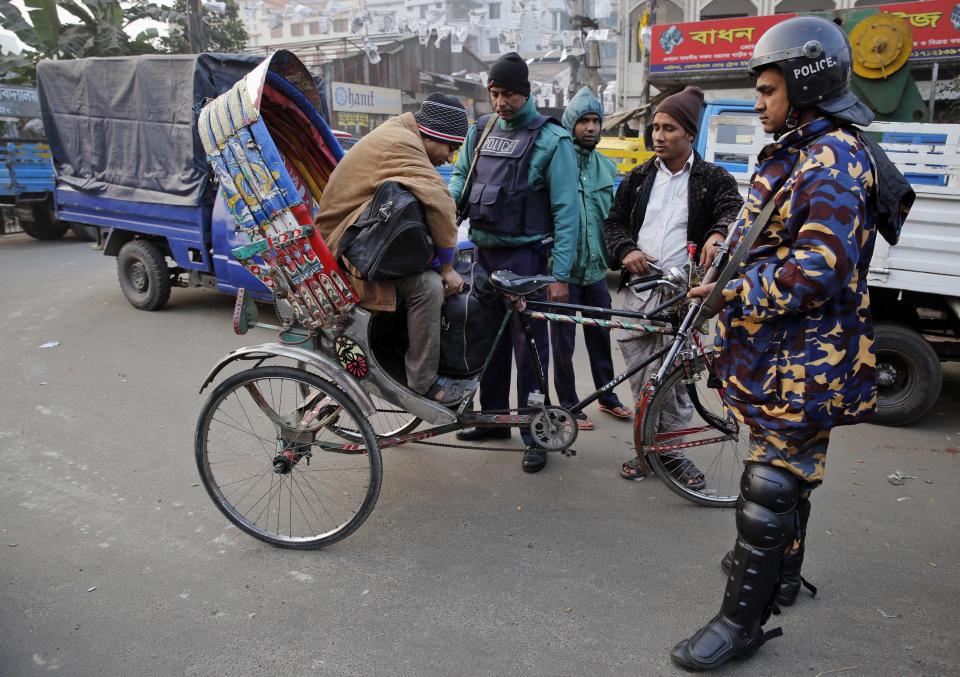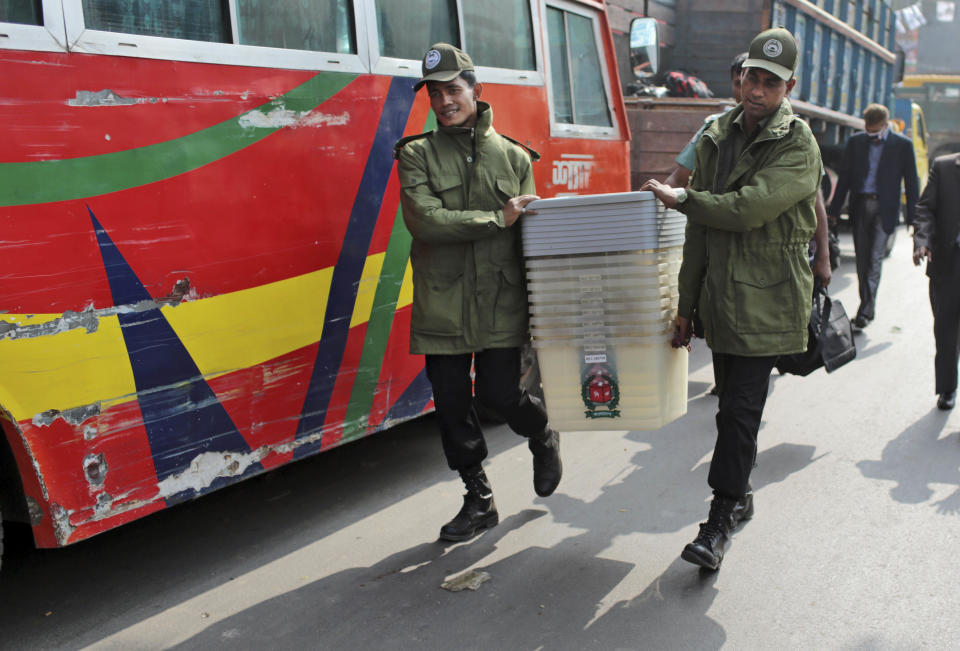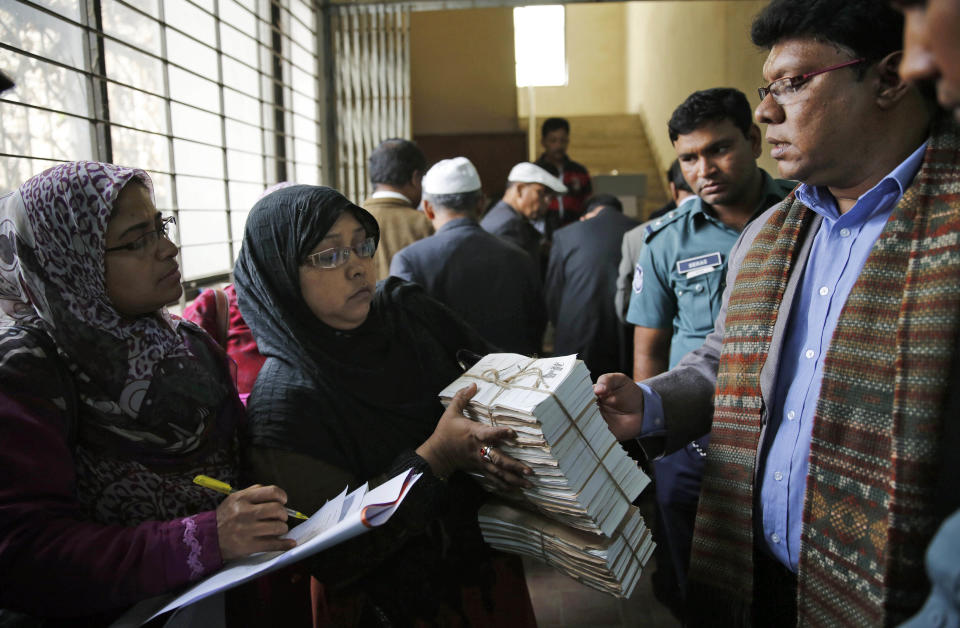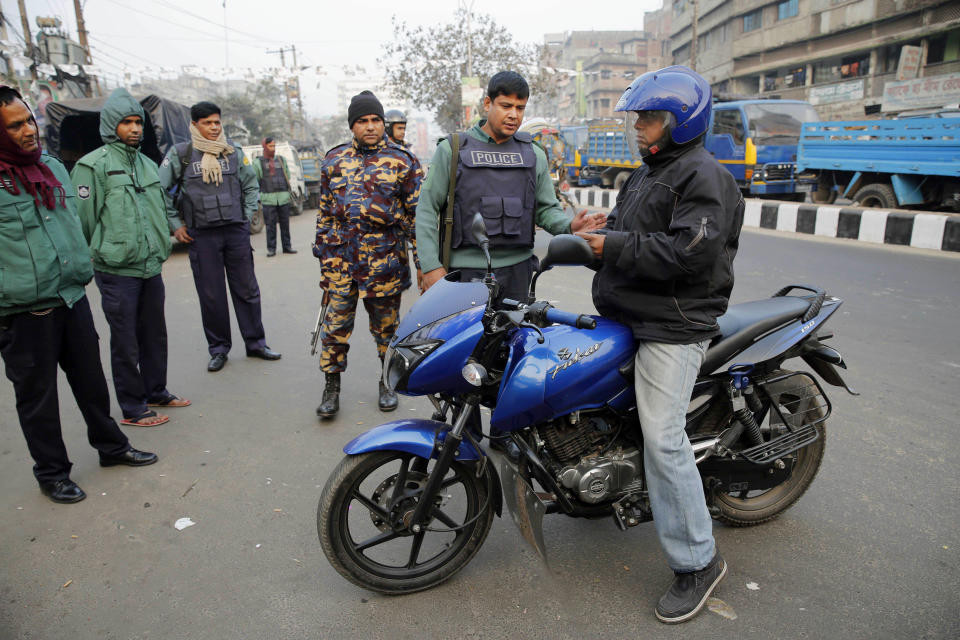Bangladesh vote unlikely to stem wave of violence
DHAKA, Bangladesh (AP) — The run-up to Sunday's general election in Bangladesh has been marked by bloody street clashes and caustic political vendettas, and the vote threatens to plunge this South Asian country even deeper into crisis.
The opposition and its allies are boycotting the vote, a move that undermines the legitimacy of the election and makes it unlikely that the polls will stem a wave of political violence that killed at least 275 people in 2013.
Much of the capital, Dhaka, has been cut off from the rest of the country in recent weeks, as the opposition has pressed its demands through general strikes and transportation blockades. Civilians have been caught up in the bloodshed, with activists torching vehicles belonging to motorists who defy the strikes, leading to a growing sense of desperation over the political impasse. Up to 50 schools and other facilities to be used as polling stations have been burned down since Friday, TV reports said.
"I want to go to vote, but I am afraid of violence," said Hazera Begum, a teacher in Dhaka. "If the situation is normal and my neighbors go, I may go."
The chaos could exacerbate economic woes in this deeply impoverished country of 160 million and lead to radicalization in a strategic pocket of South Asia, analysts say.
The opposition demands that Prime Minister Sheikh Hasina step down and appoint a neutral caretaker administration to oversee the election. But Hasina has refused, which means the election will mainly be a contest between candidates from the ruling Awami League and its allies. Awami League candidates are running unchallenged in more than half of the country's 300 parliamentary constituencies.
Bangladesh has a grim history of political violence, including the assassinations of two presidents and 19 failed coup attempts since its independence from Pakistan in 1971.
"I am fearful that deadly violence could return, people would continue to suffer, political forces with extreme views could emerge in the face of government crackdown and repressive measures," said Asif Nazrul, a law teacher and analyst. "This election will just pollute our very new democracy by shrinking the space for opposite views."
The squabbling between Hasina and opposition leader Khaleda Zia — known as the "Battling Begums" — has become a bitter sideshow as both women vie to lead the country. "Begum" is an honorific for Muslim women of rank.
The bickering between the two longtime rivals caused an uproar in October, when the women spoke for the first time in years in an acrimonious telephone call.
"I called you around noon. You didn't pick up," Hasina said, according to a transcript published in the Dhaka Tribune, an English-language newspaper.
Zia, leader of the Bangladesh Nationalist Party, said the prime minister was wrong.
"You have to listen to me first," Zia snapped.
Last weekend, after authorities barred Zia from leaving her home to join a rally, she told police that she would change the name of Gopalganj, Hasina's home district, if she came to power.
Her outburst was broadcast live on TV while roads around her home were heavily guarded and sand-laden trucks were parked to obstruct her movement.
On Friday, Zia again urged people to boycott what she called "farcical" elections. "None at home and abroad will legitimize it," she said.
Zia and Hasina have dominated Bangladeshi politics for two decades, which is more a reflection of South Asia's penchant for political dynasties than of the role of women in this mostly Muslim nation.
A key factor in the latest dispute is the role of Jamaat-e-Islami, the country's largest Islamic political party. The party is a key ally of Zia, and was a coalition partner in the government Zia led from 2001 to 2006.
Opponents of Jamaat-e-Islami say it is a fundamentalist group with no place in a secular country. Bangladesh is predominantly Muslim, but is governed by largely secular laws based on British common law.
The execution last month of Abdul Quader Mollah, a Jamaat-e-Islami leader and a key member of the opposition, exposed the country's seething tensions.
Mollah was the first person to be hanged for war crimes in Bangladesh under an international tribunal established in 2010 to investigate atrocities stemming from the 1971 war of independence against Pakistan.
Bangladesh says Pakistani soldiers, aided by local collaborators including Mollah, killed at least 3 million people and raped 200,000 women during the nine-month war. The case remains politically volatile because most of those being tried are connected to the opposition.
In the wake of Mollah's hanging, the country's polarization was clear. Even as hundreds of people rejoiced in the streets of Dhaka, saying justice had been served, others launched violent protests and torched homes and businesses belonging to government supporters.
After Mollah was hanged, a Jamaat-e-Islami leader, Makbul Ahmed, vowed to deepen the role of Islam in the country to avenge the execution.
As the political situation unravels, Bangladesh also is trying to emerge from suffocating poverty and reinvigorate its $20 billion garment industry. The industry has been rocked by a series of disasters, including a factory collapse in April that killed more than 1,100 workers. The deaths laid bare the harsh working conditions in an industry that employs 4 million Bangladeshis and provides clothing to major Western retailers.
The European Union, the United States and the British Commonwealth said they would not send observers for Sunday's election.
"We're disappointed that the major political parties have not yet reached a consensus on a way to hold free, fair and credible elections," U.S. State Department deputy spokeswoman Marie Harf told reporters in Washington on Monday. "We are prepared to re-engage our efforts and in particular our observation efforts at a later time if there is a more conducive environment, but we are disappointed that so far they haven't done so."






